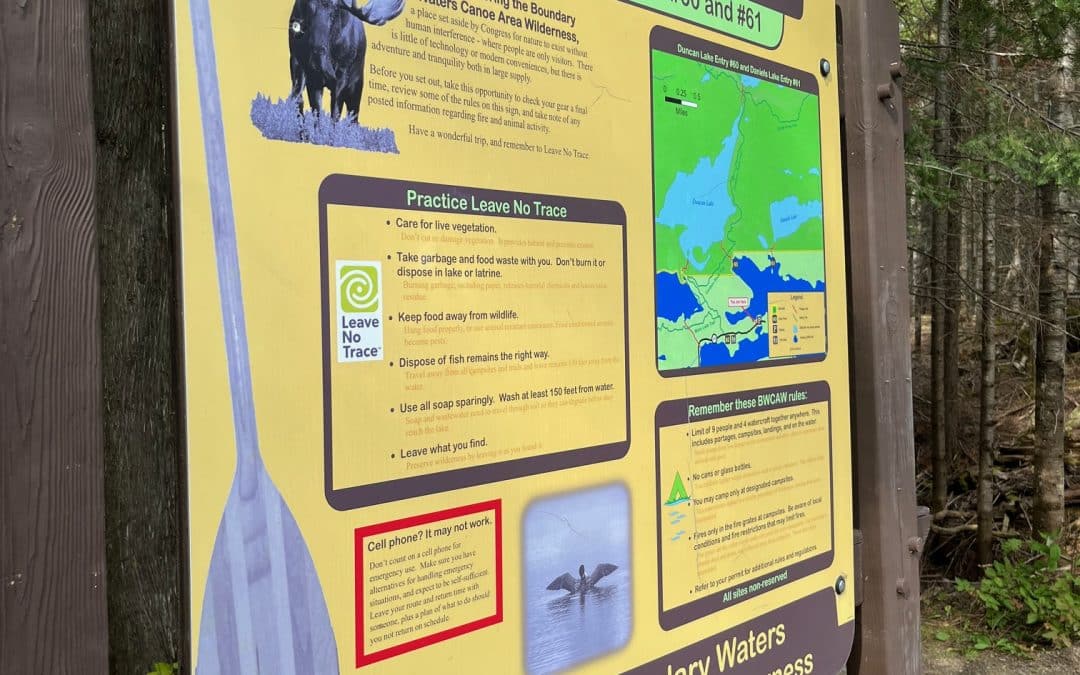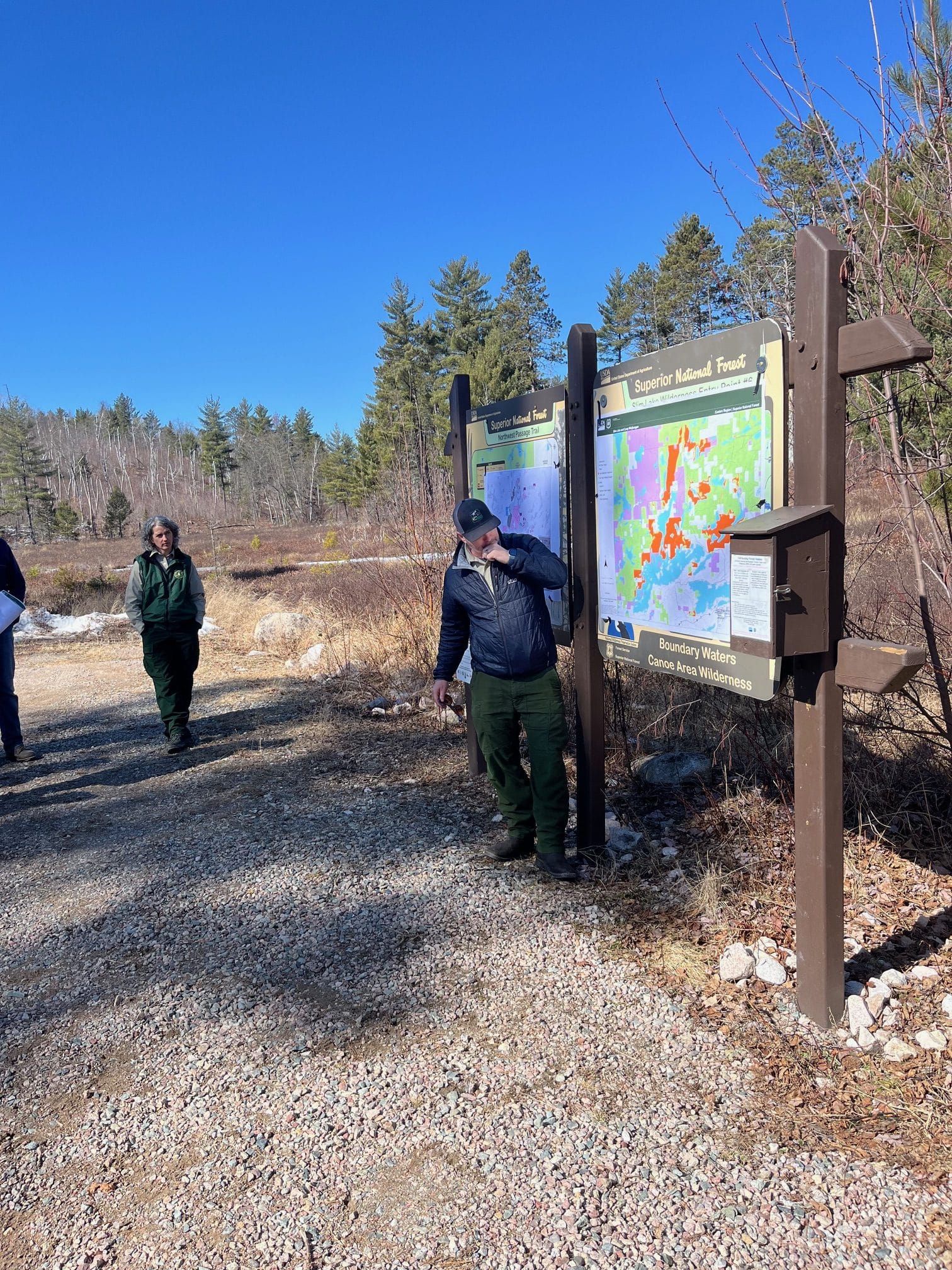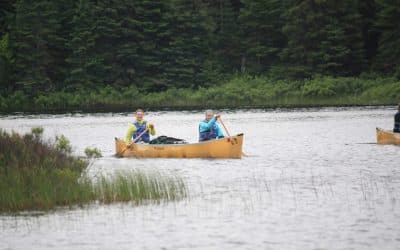The use of motorboats on certain lakes in the Boundary Waters Canoe Area Wilderness is among a list of topics the U.S. Forest Service says it plans to review and likely change within the next two years.
Other things the Forest Service could address in terms of how it manages the BWCA are changing (reducing or increasing) the number of campsites in the designated wilderness and changing the number of permits that are available annually for those who visit the most popular wilderness area in the nation, among other topics.
The Forest Service is starting to gather input from the public regarding management of the BWCA. This initial phase of “we want to hear from you” started today (March 29) and will run through May 17. Based on the current management situation and given that the “forest plan” direction for the BWCA is more than 30 years old, the Forest Service says they are “considering making an amendment to update and modernize Forest Plan direction” for the BWCA. Any updates to the plan are likley to be complete by April 2026, according to the project’s website.
Motorized boats and commercial tows inside the wilderness line will be a significant issue when the Forest Service revisits the plan it uses to manage the BWCA. Last summer, a court ruling denied a request from the environmental group Wilderness Watch to immediately stop motorized towboat usage in the BWCA.
The June 2023 ruling came about two months after the news of a court case that could end the longstanding practice of using motorized towboats to help BWCA visitors get started on their wilderness trips.
The Forest Service allows the use of towboats to assist canoeists starting their BWCA journey, dispersing visitors deeper into the million-acre BWCA. Some outfitters at the end of the Gunflint also use the towboat service to help paddlers reach Quetico Provincial Park via the Cache Bay Ranger Station.
On the eastern side of the wilderness, altering how many or shutting down commercial tows would impact Tuscarora Lodge and Outfitters, Seagull Outfitters, and Voyageur Canoe Outfitters most prominently. The ruling would have a much larger impact on the Ely area, where many canoeists receive a tow across Moose Lake each season, among other lakes in the Ely area.
Last summer, Judge Nancy Brasel said that halting the tow services would impact the ability for “older visitors and visitors with limited mobility” to experience the BWCA.
Brasel ruled on the request for an immediate injunction on tow services for the 2023 paddling season. Environmental advocates said last year they are still hoping the Forest Service will significantly scale back the tow systems that currently operate in select areas of the BWCA, including areas at the end of the Gunflint Trail.
Wilderness Watch, one of the groups at the forefront of the charge to change motorized use in the BWCA, claims that the Forest Service is not upholding its self-imposed restrictions and limitations of towboat services. The Forest Service’s most recent figures showed that in 2019, there were 4,817 tow boat trips, and 3,815 total trips in 2020. These figures amount to nearly “tripling the level that the Forest Service pledged that it would limit the total to,” according to officials from Wilderness Watch.
Public comments on this topic and others, such as the number of campsites the BWCA should have, can be made through May 17 on the project webpage electronically, or in hard copy submitted to the Forest Service office in Duluth.
There will be an open house, in-person event Thursday, April 11 from 4:30-7 p.m. at the Superior National Forest Headquarters in Duluth. A virtual open house will take place April 18 from 4-6 p.m.
Changes to the agency’s forest plan directive can better position the Forest Service to restore and preserve wilderness character and meet the purposes of wilderness described in the 1964 Wilderness Act and subsequent BWCA Wilderness Act from 1978, according to Tom Hall, the forest supervisor for Superior National Forest. The management direction for the BWCA was last updated in 1993, Hall said in a press release Friday.
“Our implementation and monitoring over the past 30 years, and changes to national wilderness management policy and guidance, has highlighted several issues affecting wilderness character in the BWCAW and the wilderness experience for visitors,” Hall said.
Another topic that is likely to be addressed as the forest plan for the BWCA is revisited is the number of campsites inside the wilderness and how many permits are offered for paddlers and hikers from May 1 to Sept 30 each year. The number of people legally allowed to enter the BWCA for overnight camping trips from May through September was reduced ahead of the 2022 paddling season.
“We are reducing quota across the forest at entry points where we frequently get comments from visitors about congestion, crowding, or natural resource degradation,” Forest Service officials said at the time.
Each year from May 1 to Sept. 30, visitors taking an overnight paddle or hiking trip, or a motorized day trip into the BWCA are required to obtain a quota permit. With permits in high demand during recent paddling seasons some canoeists struggled to find available campsites, particularly near popular lakes such as Sawbill, Brule, Duncan and Seagull on the east side of the BWCA.
Ten out of the 34 entry points on the Gunflint District and six of the 13 entry points on the Tofte District saw a reduction in permit quota numbers in 2022. All districts across the BWCA saw a quota reduction that year.
Forest Service officials maintain that many BWCA entry points and associated routes are regularly experiencing social resource concerns such as crowding, disruptive and oversized groups, lack of campsite availability or unsettling competition for campsites. Illegal camping is also becoming more of a problem in the BWCA.
Reducing the number of overnight permits to the BWCA could reduce some visitation to the wilderness, but day permits are free and do not operate on a quota system. Many of the popular entry points to the BWCA can become congested with day users, the Forest Service acknowledged in 2022. One example of this is the iconic stairway portage located between Duncan and Rose lakes. Reports from recent years by BWCA visitors included literal lines forming to get up or down the portage and to view the waterfalls between the two lakes.
The issues to be addressed in a Wilderness Chapter Forest Plan Amendment include, but are not limited to the following:
- Increasing visitation and changing trends in utilizing public lands and primitive management areas in general are adversely impacting all four management areas of the BWCA; in particular high use campsites and travel routes, as well as previously under-visited primitive and pristine areas utilized to escape people and crowding in popular locations. Monitoring has indicated both social and ecological impacts, such as crowding, noise, light pollution, lack of campsite availability, littering, campsite and portage erosion, campsite expansions, water quality degradation, and other issues preventing the Forest from managing to standard. There is a need to update management direction to preserve wilderness character to provide opportunities for solitude or a primitive and unconfined type of recreation, restore naturalness, limit development and trammeling actions, and protect other features of value across the Wilderness.
- The BWCA Towboat Prescoping notice sent out in August 2023 garnered over 1,300 comments. The primary issues identified from input in that prescoping outreach related to how towboats are managed in the overall motorboat cap within the BWCA and the impact that towboats have on wilderness character. Management of the towboat commercial service is just one aspect of the larger whole related to both motorized use and wilderness character. To effectively manage commercial towboat use in the BWCAW, management direction in the existing Forest Plan concerning commercial towboats may need to be updated to address specific standards and guidelines to continue to preserve wilderness character and ensure compliance with the statutory limits set in the 1978 BWCAW Act. In addition to commercial towboat use, there is a need to consider the context of motorized use in general within the BWCAW, as provided for by existing law.
- Much of the Superior National Forest has fire-adapted ecosystems and large fires have occurred periodically on the landscape. The current Forest Plan contains project-specific Plan amendments to allow management-ignited prescribed fire in the BWCA on a project-by-project basis over the past 25 years. Where multiple project-specific Plan amendments are done for a given issue, it suggests consideration towards a programmatic Plan amendment to allow lightning fires to play a more natural role.
- Additional management topics include, but are not limited to fisheries stocking, survey and spawn take; commercial outfitter and guide operations; visitor use management (overnight paddle and hiking quota, campsites); special provisions; structures; other agency use; wilderness education plans; the reservation system and research needs.
Based on public comments and input, as well as applicable law, regulation, policy, and guidance, the Forest Service will develop a proposed “forest plan amendment” to address the purpose and need for action.
Other Recent Articles
Congress Talks Wolves and Mining As Quota Season Starts in the BWCA
Photo by Eva Blue on UnsplashNewsToo many wolves and not enough mining near the Boundary Waters Canoe Area Wilderness. These were two themes brought to the forefront of Congress this week at the urging of U.S. Rep. Pete Stauber, who represents all of northeastern...
Young Cancer Survivor Talks About the Importance of Wilderness
Julia Ruelle (stern) paddles in the BWCA during her "parent-free trip" the wilderness. Submitted photoNote: Julia was the winner of Ely Outfitting Company’s first annual Boundary Waters Teen Essay Contest in 2018. She was 16 years old and a sophomore at Minnetonka...
Minnesota Governor and Media React to Last Entry Point
(From left) Cathy Wurzer, Joe Friedrichs and Eric Eskola on the Almanac set. Photo by Kari KennedyI was in an elevator with Cathy Wurzer. So, naturally, we started to talk about death. It’s a topic we’re both intrigued by. Death. Dying. The end. I just wrote a book...





